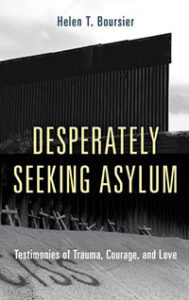Review: Desperately Seeking Asylum
Desperately Seeking Asylum: Testimonies of Trauma, Courage, and Love
By Helen T. Boursier (Rowman & Littlefield)
Helen T. Boursier is a passionate advocate for women and children seeking asylum in the United States. While a pastor of a Presbyterian church plant north of San Antonio, she also served as a volunteer chaplain for asylum seekers being held in a for-profit immigrant detention facility.
 Part of her ministry included “art as spiritual care,” and she includes some examples of art by immigrants throughout Part 1. Boursier’s ministry grew to include caring for immigrant families’ practical concerns and eventually to advocacy more broadly.
Part of her ministry included “art as spiritual care,” and she includes some examples of art by immigrants throughout Part 1. Boursier’s ministry grew to include caring for immigrant families’ practical concerns and eventually to advocacy more broadly.
Desperately Seeking Asylum comes from her experience with thousands of immigrants. It is a thorough examination of the situation along the U.S.-Mexico border from 2014 to 2019. Though some policies have changed since then, the content still holds relevance for ongoing efforts to address immigration along the U.S.-Mexico border.
The book’s arc begins with why people seek asylum in the United States, details the tangled mess of immigration policy and practice, and concludes with practical and hopeful chapters for those wanting to become involved in seeking justice for immigrants and asylum seekers.
Part 1 details a breakdown in justice leading people to seek asylum in the United States. Pulling from immigrant testimonies, Boursier describes a hopeless situation in a Central America overrun with gangs and government corruption. The suffering is enough to lead thousands to risk more suffering while traveling north. After being detained at the U.S.-Mexico border, they were detained in facilities they named hielera (cooler)—for the frigid air inside—and perrera (dog kennel)—for their similarity to a dog pound.
Part 2 outlines U.S. government attempts to address immigration along the U.S.-Mexico border. Boursier explains the 1997 Flores Settlement Agreement and its relation to the Trump administration’s policies during 2018 and 2019. She also lays out changes in those policies and the struggle immigrants experience navigating them, what she considers a further breakdown in justice.
Part 3 describes Boursier’s own response, which is rooted in a theology of hospitality, love of neighbor and solidarity. She admits to her own new experiences, such as learning who her elected officials were and communicating with them for the first time. Her description of the breadth of advocacy for immigrants and asylum seekers is as thorough as the other sections of the book.
Boursier calls readers to be involved personally in seeking justice for immigrants and those seeking asylum. She points to the many ways to engage in hospitality, love of neighbor and solidarity for, toward and with men, women and children not all that unlike us.
Eric Black, executive director/editor/publisher
Baptist Standard